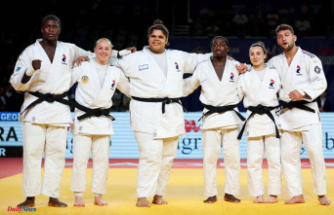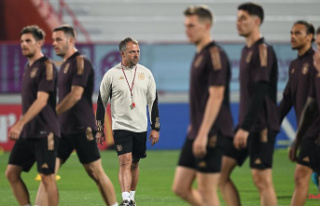In Islam, respect for the elderly is very important. How fitting that a number of old stars cavort in the quarter-finals with Ronaldo, Messi and Co. In stark contrast, Qatar's population is one of the youngest on earth - and young men are breaking up as the world cheers on the World Cup oldies.
"If a young person shows respect to an old person because of his age, Allah will send him people who will show respect to him in old age." These words come from the scholar Muhammad Al-Tirmidhi, author of one of the canonical collections of traditions in Islamic literature in the 9th century. Showing respect and treating elders with compassion for their life experiences is an important religious as well as moral duty in Islamic societies.
Far more attention is paid in Qatar than in Western societies to not only showing respect and recognition to one's own parents, but also to all other people of advanced age. In crowded subways, younger passengers get up immediately and offer their seats to older ones. In queues they are let in.
So it's fitting that the super oldies are now having an unprecedented showdown in the quarter-finals of the World Cup. Relatively speaking, of course, men of footballing age are already grandfathers from their mid-30s. Only four kickers have been awarded the Ballon d'Or since 2008: Lionel Messi (seven times), Cristiano Ronaldo (five times), Luka Modric (once) and Karim Benzema (once). With the exception of the injured Benzema (for the 34-year-old, Olivier Giroud, who is two years his senior, performs magic in the French striker), they are all still fighting for the World Cup crown.
Messi (35) and his Argentines (the fourth-oldest team in the tournament at an average age of 27.8) meet the Netherlands, where a 32-year-old Daley Blind - who, with his increasingly thinning hair, looks like an unfit family man who in khakis at a picnic with a loose kick in the park - the athletic right winger of the USA with Sergino Dest (22), Weston McKennie (24) and Timothy Weah (22) showed what aging professionals are capable of.
For Messi, like superstar colleague Ronaldo (37), it should be the last World Cup. Last big fight of career. The last chance for ultimate glory. The last chance to outdo the eternal opponent. The Portuguese, who caused a stir in the round of 16 for his bankroll and alleged threats to leave the tournament, must first face Spain-shock Morocco - but in fact it could be the ultimate showdown between him and Messi in the final.
On the one hand, France wants to prevent this with a mixture of young (Kylian Mbappé, 23; Aurélien Tchouaméni, 22; Ousame Dembélé, 25) and old (Giroud; Hugo Lloris, 35; Antoine Griezmann, 31). On the other hand, Brazil's veterans (the third oldest team in the tournament at an average of 27.9 years) are one of the top favorites for the title after beating South Korea 4-1. Central defender Thiago Silva (38) and right-back Dani Alves (39) have to face Modric (37) and his Croatians first.
The respect of the Qataris is certain for the many oldies. The German grandfathers, Thomas Müller (33) and Manuel Neuer (36), were repeatedly highlighted by fans and on posters in Doha. But just like the aging almost Ballon d'Or winner Robert Lewandowski (34), they are already eliminated. Will they play a World Cup again? Unlikely.
In stark contrast to the many World Cup veterans, however, Qatari society is one of the youngest on the planet. While around 50,000 people lived in the desert state in 1950, there are now around three million. Although the birth rate in the emirate is comparatively high, the massive recruitment of guest workers is primarily responsible for this explosion in population. They make up about 90 percent of the population, which has an average age of 33.7 years.
Men between the ages of 30 and 39, who are considered oldies in football, are the most common in Qatar. But because they do not fall under the age rule for footballers and migrants in the emirate are stigmatized as scapegoats for the grievances in modern society, they do not deserve the slightest bit of respect. Exactly the opposite prevails, the contrast could not be more blatant: while the showdown of the super oldies increases in the World Cup quarterfinals, while old Qataris stand up for themselves in the subway, they have to submit and struggle with unequal treatment.
The young guest workers do not experience the privileges of Qatari nationals. Like free electricity and free water. Like access to education and healthcare. Like tax exemptions. Only citizens are entitled to residency and the right to a job - and guest workers are almost never naturalized (legally only possible after a stay of at least 20 years).
Many of the young men suffer from the unequal treatment in the emirate and worry about their families in their home countries. They tell how they are trying to save money here in order to maybe make up for it at some point or to send over the savings. But due to the high cost of living and the low pay, this is hardly possible. For them, the World Cup brings little good. They break inside as the world cheers for the Messis, Ronaldos and Modrics.
"I worked in Saudi Arabia for eleven years, I've only been in Qatar for four months," says an Indian waiter. "It's just too expensive here and you have to work at least 13 hours a day." In Saudi Arabia he would have had normal working days of eight hours, after the World Cup he probably wants to go back there.
He doesn't have time to think about the showdown of the super oldies or to visit one of the games with the money. "I only do all this for my family," says the young man and continues to work.












